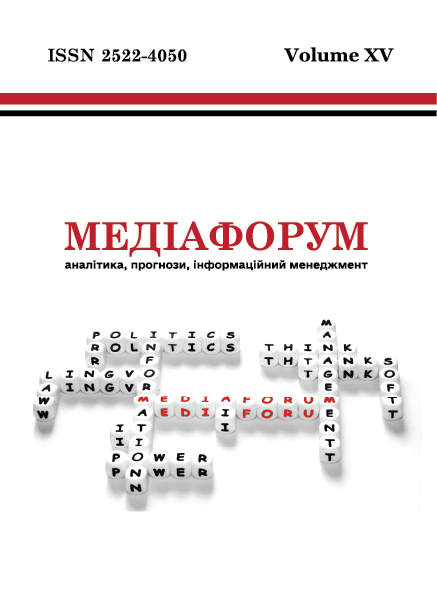The Impact of the Russian-Ukrainian War on the Future of Regional Security in Central and Eastern Europe
DOI:
https://doi.org/10.31861/mediaforum.2024.15.11-41Keywords:
regional security complex, Central-Eastern Europe, Russian-Ukrainian war, NATO, multipolarity, Russia, USAAbstract
The article is devoted to the analysis and forecasting of the impact of the Russian-Ukrainian war on the formation of the regional security complex in Central and Eastern Europe (CEE) and its role in the new European security architecture. The article examines the factors of both the global and regional level that caused the formation of such security complexes. It has been proven that the transformation of the system of international relations towards multipolarity became the main of such factors. Special attention is paid to the study of the impact of the Russian-Ukrainian war on the formation of two mega-blocs that act as subjects of the global conflict. The article substantiates the hypothesis that this war caused fundamental changes in the international system, which include, first of all, a global change in the balance of power and interests, a new geopolitical restructuring, and the emergence of new geopolitical players in the struggle for global and regional dominance and the destruction of existing security structures in Europe, which necessitates the construction of a regional security complex in the CEE.
Downloads
References
Aleksandr Dugin.1997. Osnovy geopolitiki. Geopoliticheskoye budushcheye Rossii, M.: «Arktogeya», 608 s.
Zanevych Matsey. 2017. U poloni starykh kontseptsiy: shcho vplyvaye na ukrayinsʹku polityku Polʹshchi. EASTBOOK, 19 zhovtnya. URL: https://www.eurointegration.com.ua /articles/2017/10/19/7072409/
Marselʹ KH. Van Kherpen. 2015. Viyna Putina. Chechnya. Hruziya. Ukrayina: nezasvoyeni uroky mynuloho. KH.: Vivat, 304 s.
Klauzevits K. 1937. «O voyne», Moskva, 560 s.
Perepelytsya H.M. 2003. Henezys konfliktiv na postkomunistychnomu prostori Yevropy. K., 256 s.
Starodub T. 2012. Osoblyvosti stanovlennya rehionalʹnoï komparatyvistyky yak naukovoho napryamu politychnoï rehionalistyky. Politychnyy̆ menedzhment. No 3(54). S. 22–31.
Khantington S. 1994. Stolknoveniye tsivilizatsiy? Polis. № 1. S. 33–48.
Shvechykova YA. P. 2015. Mistse Ukrayiny u strukturi yevropeysʹkoho rehionalʹnoho kompleksu bezpeky. Aktualʹni problemy mizhnarodnykh vidnosyn. Vypusk 126 (chastyna I). s.71-78.
Bond I. 2017. Contested Space. Eastern Europe between Russia and the EU, Centre for Eurpean Reform, London. URL: https://www.cer.eu/publications/archive/policy-brief/2017/contested-space-russian-and-eu-relations-eastern-europe
Bukkvoll, Tor. 2016. Russian Special Operations Forces in the war in Ukraine – Crimea and Donbas, in: The US Army War College Quarterly: Parameters 46, no. 2 . URL: https://p ress.armywarcollege.edu/parameters/vol46/iss2/4
Buzan B.1991. People, States and Fear: An Agenda for International Security Studies in the Post Cold War Era (Second Ed). New York. Harvester Wheatsheaf. 398 p.
Buzan B., Wæver O., Wilde J. 1998. Security: a new framework for analysis. Colorado. Lynne Rienner Publishers, Inc. 239 p.
Buzan B., Wæver O. 2003.Regions and Powers. The Structure of International Security. Cambridge. Cambridge University Press. 564 p.
Сonstructivism and International Relations. Alexander Wendt and his critics. Edited by Stefano Guzzini and Anna Leander. 2005. Pub. Location London Imprint Routledge. 272р
Collins R. 1986. Weberian Sociological Theory. New York: Cambridge University Press. Р.187-191.
Cooper Robert. 2002. The New liberal imperialism. The Guardian, April 7. URL:https://www.theguardian.com/world/2002/apr/07/1
Feltman J. 2023. War, peace, and the international system after Ukraine. URL: https://www.brookings.edu/articles/war-peace-and-the-international-system-after-ukraine/
Fukuyama F.1989. The End of History?, The National Interest, 16. 122р.
Galtung J. 1971. A Structural Theory of Imperialism, Journal of Peace Research, 2 (8). URL:https://journals.sagepub.com/doi/10.1177/002234337100800201
Gray C. S.1999. Strategic Culture as Context: The First Generation of Theory Strikes Back, Review of International Studies, 25.
Keohane R., Nye J. 2012. Power and Interdependence, Boston. URL:https://scholar.google.com.ua/scholar?q=Keohane+R.,+Nye+J.+(2012),+Power+and+Interdependence,+Boston.&hl=uk&as_sdt=0&as_vis=1&oi=scholart
Kimmage M., Notte H. 2023. How Russia Globalized the War in Ukraine? The Kremlin’s Pressure-Point Strategy to undermine the USA, Foreign Affairs, September 1.
Kotkin S. 2022. What Putin Got Wrong About Ukraine, Russia, and the West. Interview by Daniel Kurtz-Phelan, Foreign Affairs, May 31.
Kotoulas, I. E., Pusztai, W. 2022. Geopolitics of the War in Ukraine. Foreign Affairs Institute, June. URL: https://euagenda.eu/upload/publications /geopolitics-of-the-war-in-ukraine
Leyne S. 2023. After Russia’s War Against Ukraine: What Kind of World Order? URL: https://carnegieendowment.org/research/2023/02/after-russias-war-against-ukraine-what-kind-of-world-order?lang=en¢er=europe
McKenzie Mary M., Loedel. Peter H. The Promise and Reality of European Security Cooperation: States, Interests, and Institutions, Greenwood Publishing Group, 1998, 197 p.
Maria Sabina LAZĂR. The Ukrainian Crisis Seen from a Regional Perspective: Isolated Conflict or Driving Agent for Regional Security Dynamics? URL: http://europolity.eu/wp-content/uploads/2014/12/Vol.8.No_.2.2014_37-61.pdf.
Mearsheimer J. (2014), Why the Ukraine Crisis Is the West’s Fault. The Liberal Delusions That Provoked Putin, Foreign Affairs, September/October.
Miliband D. (2023), The World Beyond Ukraine The Survival of the West and the Demands of the Rest, Foreign Affairs, May/June.
The Russian Challenge, (2015), Chatham House Report. London. RIIA.
Sunak, H. 2023. Discuss Ukraine, call the conflict «a global war». URL: https://www.reuters.com/world/sunak-harris-discuss-ukraine-call-conflict-a-global-war-2023-02-18














